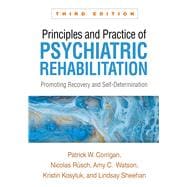The leading text and go-to practitioner resource on psychiatric rehabilitation is now in a thoroughly revised third edition, bringing readers up to date on current ideas, findings, and evidence-based best practices. The expert authors present the knowledge needed to help adults with psychiatric disabilities develop their strengths and achieve their life goals. The book describes effective ways to assess personal needs and aspirations; integrate medical and psychosocial interventions; implement supportive services in such areas as housing, employment, education, substance use, and physical health; and combat stigma and discrimination. "Personal Examples" throughout the text share the experiences of diverse individuals recovering from serious mental illness.
New to This Edition
*Increased attention to social determinants of health--for example, the impact of race, ethnicity, gender identity, sexual orientation, poverty, and criminal justice involvement.
*Chapter on developing more equitable, culturally competent services.
*Expanded coverage of physical health and wellness.
*New and expanded discussions of community-based participatory research, peer recovery support providers, and other timely topics.








